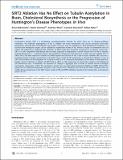SIRT2 Ablation Has No Effect on Tubulin Acetylation in Brain, Cholesterol Biosynthesis or the Progression of Huntington's Disease Phenotypes In Vivo
Author(s)
Bobrowska, Anna; Donmez Yalcin, Gizem; Weiss, Andreas; Guarente, Leonard Pershing; Bates, Gillian P.
DownloadBobrowska-2012-SIRT2 Ablation Has N.pdf (1.795Mb)
PUBLISHER_CC
Publisher with Creative Commons License
Creative Commons Attribution
Terms of use
Metadata
Show full item recordAbstract
Huntington's disease (HD) is a devastating neurodegenerative disorder for which there are no disease-modifying treatments. The molecular pathogenesis of HD is complex and many mechanisms and cellular processes have been proposed as potential sites of therapeutic intervention. However, prior to embarking on drug development initiatives, it is essential that therapeutic targets can be validated in mammalian models of HD. Previous studies in invertebrate and cell culture HD models have suggested that inhibition of SIRT2 could have beneficial consequences on disease progression. SIRT2 is a NAD[superscript +]-dependent deacetylase that has been proposed to deacetylate α-tubulin, histone H4 K16 and to regulate cholesterol biogenesis – a pathway which is dysregulated in HD patients and HD mouse models. We have utilized mice in which SIRT2 has been reduced or ablated to further explore the function of SIRT2 and to assess whether SIRT2 loss has a beneficial impact on disease progression in the R6/2 mouse model of HD. Surprisingly we found that reduction or loss of SIRT2 had no effect on the acetylation of α-tubulin or H4K16 or on cholesterol biosynthesis in the brains of wild type mice. Equally, genetic reduction or ablation of SIRT2 had no effect on HD progression as assessed by a battery of physiological and behavioural tests. Furthermore, we observed no change in aggregate load or levels of soluble mutant huntingtin transprotein. Intriguingly, neither the constitutive genetic loss nor acute pharmacological inhibition of SIRT2 affected the expression of cholesterol biosynthesis enzymes in the context of HD. Therefore, we conclude that SIRT2 inhibition does not modify disease progression in the R6/2 mouse model of HD and SIRT2 inhibition should not be prioritised as a therapeutic option for HD.
Date issued
2012-04Department
Massachusetts Institute of Technology. Department of Biology; Paul F. Glenn Center for Biology of Aging Research (Massachusetts Institute of Technology)Journal
PLoS ONE
Publisher
Public Library of Science
Citation
Bobrowska, Anna et al. “SIRT2 Ablation Has No Effect on Tubulin Acetylation in Brain, Cholesterol Biosynthesis or the Progression of Huntington’s Disease Phenotypes In Vivo.” Ed. Hitoshi Okazawa. PLoS ONE 7.4 (2012): e34805.
Version: Final published version
ISSN
1932-6203